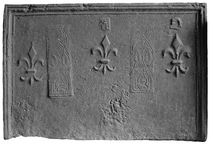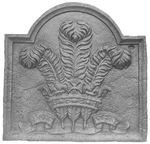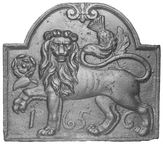-
206
Description: Rectangular with two-stepped top; double astragal edging on sides; top centre, stamp formed of a talbot statant guardant upon a wreath; date split either side of crest; initials below date, ‘+’ below letters.
Notes: The talbot crest is seen on other firebacks indicating a common source.
Copies of this fireback are known.
Inscription: 16 22 / I + H
- Decoration tags:
- stepped (shape)
- fillet (edging)
- simple stamps
- carved stamps
- individual numbers
- heraldic
- text
Manufactured: in 1622 in the Weald area of England.
Current location: St Mary's House, Bramber, West Sussex, England.
- Attached to series:
- Talbot crest series
- Stepped firebacks
-
22
Description: Arched rectangular shaped; fillet edging; a lion rampant
Notes: Whole pattern. A modern design of fireback
Copies of this fireback are known.
- Decoration tags:
- rectangular with round arch (shape)
- fillet (edging)
- whole carved pattern
- heraldic
- animals
Manufactured: in the late-19th to early-20th century in England.
Current location: St Mary's House, Bramber, West Sussex, England.
- Attached to series:
- Miscellaneous pattern firebacks
-
349
Description: Arched rectangular shape; ovolo-moulded edging; Tudor royal shield, garter, crown, motto and supporters (crowned lion and dragon); Tudor rose to right of lion’s head, portcullis to left of dragon’s head; temp. Elizabeth I.
Notes: Three versions of this fireback are known, with differing edging and one without the rose and portcullis.
Copies of this fireback are known.
Inscription: [Garter] HONI SOIT QVI MAL Y PENSE / [motto] DIEV ET MON DROIT.
Arms: Tudor royal
- Decoration tags:
- rectangular with round arch (shape)
- ovolo (edging)
- whole carved pattern
- heraldic
- armorial
- royal
- text
Manufactured: in the late-16th century possibly in the Weald area of England.
Current location: Bramshill House, Bramshill, Hampshire, England.
Citation: Baines, J. M., 1958, Wealden Firebacks (Hastings Museum).
- Attached to series:
- Tudor royal armorial firebacks
-
207
Description: Arched rectangular shape; ovolo-moulded edge; Tudor royal shield, crown, garter and supporters (dragon and greyhound). Crowned rose on left, and crowned portcullis (grid of 16) on right side of crown; the supporters stand on a horizontal fillet; date panel with ovolo-moulding on top, central putto face splitting two parts of date with faces of putti in profile at each end.
Notes: Arms are of Edward VI. A very clear casting, almost certainly from the original pattern. There are several firebacks with the Tudor royal arms that were probably produced in the Spanish Netherlands, perhaps illustrating the association between England and Spain through the marriage of Henry VIII and Katherine of Aragon. The firebacks differ in several small details, such as the form and rotation of the Garter motto, the style of the crown, the positioning of the supporters in relation to the Garter, and the form and size of the crowned rose and portcullis.
Copies of this fireback are known.
Inscription: HONI SOIT QVI MAL I PENSE / 15 48
Arms: Tudor royal Edward VI
- Decoration tags:
- rectangular with round arch (shape)
- fillet (edging)
- whole carved pattern
- planklines
- heraldic
- armorial
- royal
- text
Manufactured: in 1548 possibly at Eisenschmitt Furnace in the Eifel area of Germany.
Current location: Ockwells Manor, Cox Green, Berkshire, England.
Citation: Kippenberger, A. 1973, Die Kunst der Ofenplatten (Düsseldorf, Verlag Stahleisen), p. 107.
-
208
Description: Canted rectangle; twisted rope edging (top and sides); quasi-symmetrical arrangement of four fleurs-de-lys in star, top centre, two fleurs each side along top edge, single fleurs beneath outer top fleurs; short rope length in vertical and inverted 'V' shapes each side between top fleurs; ?dagger handle irregularly positioned centre left and right.
Notes: The style and shape of the fleurs-de-lys is unique to a particular series of firebacks, suggesting the same source; the 'V' shapes may have apotropaic significance. A sketch of this fireback c.1891 is in the collection of J. Starkie Gardner's sketch books at the Victoria and Albert Museum, Archive of Art and Design (AAD/2014/8); at the time of drawing it was stated to be in the ownership of one Simmons, a furniture dealer of Lewes.
- Decoration tags:
- rectangular with canted top corners (shape)
- rope (edging)
- simple stamps
- carved stamps
- heraldic
Manufactured: in the mid-16th century in the Weald area of England.
Current location: in private hands, Cox Green, Berkshire, England.
- Attached to series:
- Royal series
-
120
Description: Rectangular; rope edge (top and sides); rose and crown within a shield, stamped twice, both inverted, down centre; rectangular stamp with griffin, twice, in top corners.
Notes: Five other firebacks bearing these stamps are known: one is also in Hastings, and one, dated 1569, is at Hadlow Down, Sussex. The locations of the other three are not known. Formerly part of the Ade Collection (from Grove Hill, Hellingly, Sussex).
- Decoration tags:
- rectangular (shape)
- rope (edging)
- carved stamps
- heraldic
Manufactured: in the mid- to late-16th century in the Weald area of England.
Current location: Hastings Museum and Art Gallery, John's Place, Bohemia Road, Hastings, East Sussex, England.
Museum number: HASMG: 1952.51.11 (part of the Hastings Museum museum group)
Citation: Baines, J. M., 1958, Wealden Firebacks (Hastings Museum).
- Attached to series:
- Griffin series
-
852
Description: Rectangular; cyma recta (ogee) moulded edging (top and sides); fleur-de-lys stamp repeated three times across the upper part of the plate; a long pastry mould stamped between each pair of fleurs; above the central fleur, a small stamp, over-pressed, bearing FL below a coronet; above the right fleur, a small stamp, over-pressed, bearing a fish embowed.
Notes: The food moulds are variations of others used in the same series.
Inscription: FL
- Decoration tags:
- rectangular (shape)
- cyma reversa/ogee (edging)
- simple stamps
- carved stamps
- heraldic
- text
- animals
- objects
Manufactured: in the mid- to late-16th century possibly at Pounsley Furnace, Framfield in the Weald area of England.
Current location: not known.
- Attached to series:
- Food mould stamp firebacks
- Pounsley series
-
853
Description: Arched rectangular shape; cavetto edging; three ostrich feathers issuing from a royal coronet; motto banner below.
Notes: The badge of the Prince of Wales; perhaps cast during the Commonwealth period; a variant at Rottingdean Grange has pattern-maker's initials.
Copies of this fireback are known.
Inscription: ICH [DIEN]
- Decoration tags:
- rectangular with round arch (shape)
- cavetto (edging)
- whole carved pattern
- heraldic
- royal
- text
- objects
Manufactured: in the mid-17th century in the Weald area of England.
Current location: not known.
Citation: Lloyd, N., 1925, 'Domestic Ironwork I', Architectural Review, 58, pp. 58-67.
- Attached to series:
- Prince of Wales firebacks
-
399
Description: Arched rectangular shape; ovolo-moulded edging with inverted fleur-de-lys at top; lion passant guardant, with rose to the left and thistle above tail; date split between legs; single horizontal plank-line.
Notes: The boldness of the figuration suggests association with firebacks possibly cast at Brede Furnace in the same period.
Copies of this fireback are known.
Inscription: 1 6 5 6
- Decoration tags:
- rectangular with round arch (shape)
- cyma reversa/ogee (edging)
- whole carved pattern
- planklines
- heraldic
- text
- animals
- plants
Manufactured: in 1656 in the Weald area of England.
Current location: not known.
- Attached to series:
- Royalist series
-
812
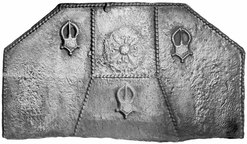 ? x ? mm
? x ? mmDescription: Canted rectangle; twisted rope edging (top and sides); divided by rope lengths into four panels: centre top, square; centre bottom, trapezium; sides, irregular hexagons; buckle stamp repeated three times, in bottom and side panels; top centre panel, circular flower stamp with fleur de lys on each petal.
Notes: The buckle stamps suggest a connection with the Pelham family; illustrated in Butterfield 1916, where it was stated to have been in a house at Herstmonceux, Sussex..
- Decoration tags:
- rectangular with canted top corners (shape)
- rope (edging)
- simple stamps
- carved stamps
- planklines
- heraldic
- objects
Manufactured: in the late-16th century in the Weald area of England.
Current location: not known.
Citation: Butterfield, W. R., 1916, 'Old Wealden Firebacks', The Connoisseur, 46, pp. 197-209.
- Attached to series:
- Pelham family firebacks
- Metalware stamp firebacks
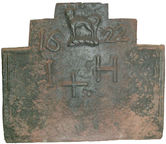
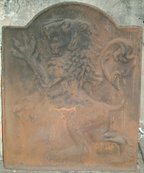
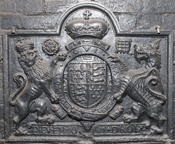
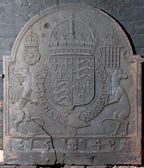

.jpg)
